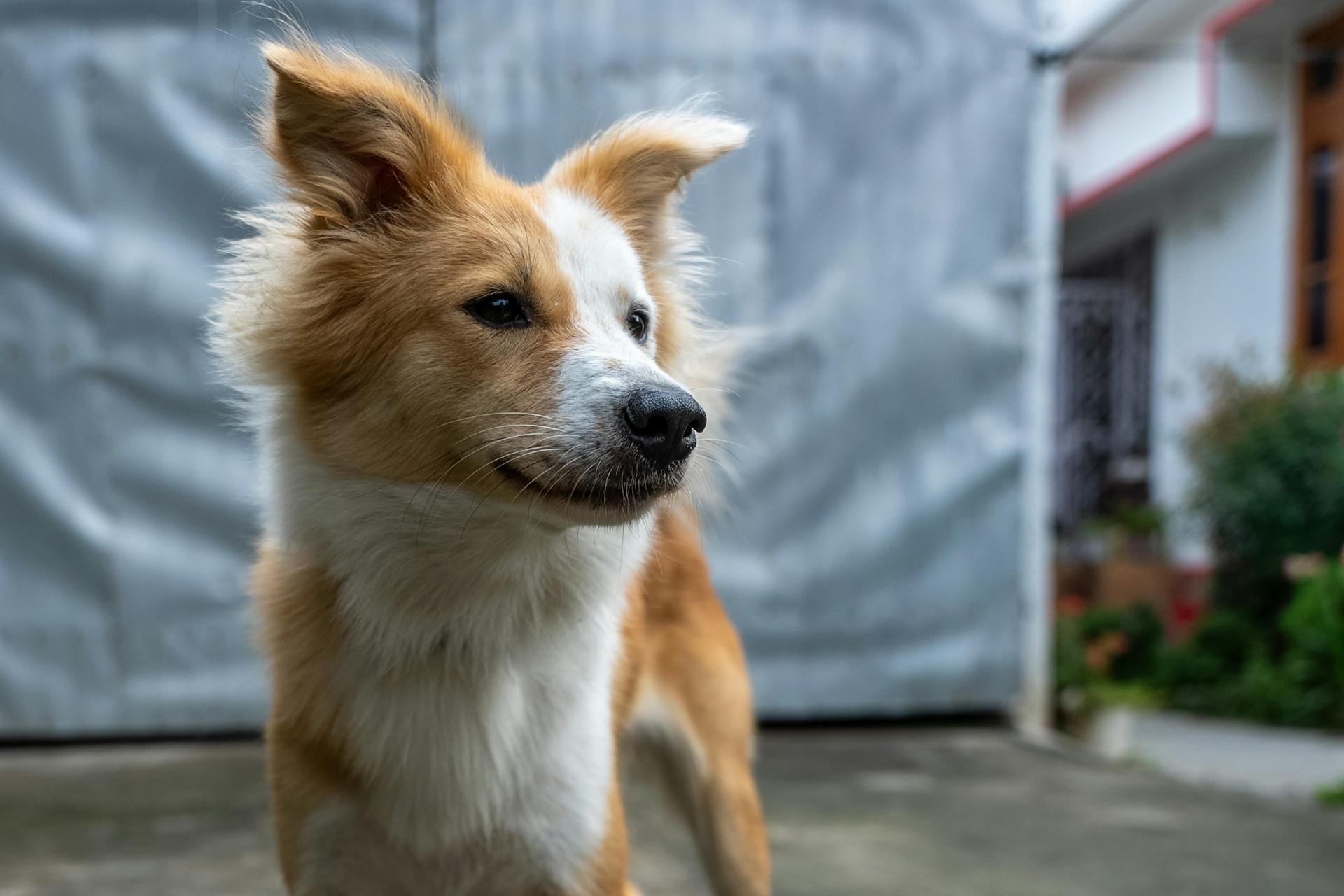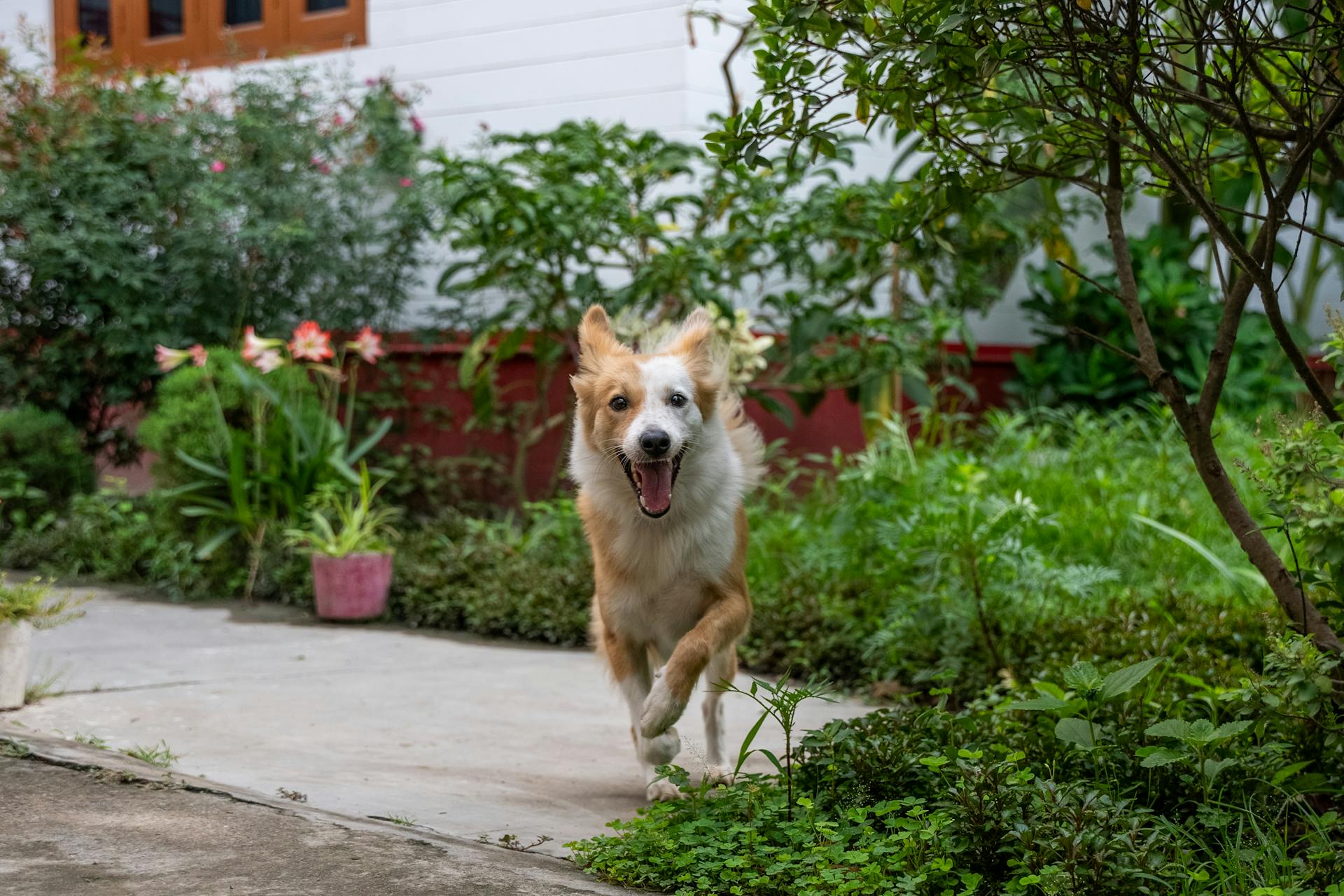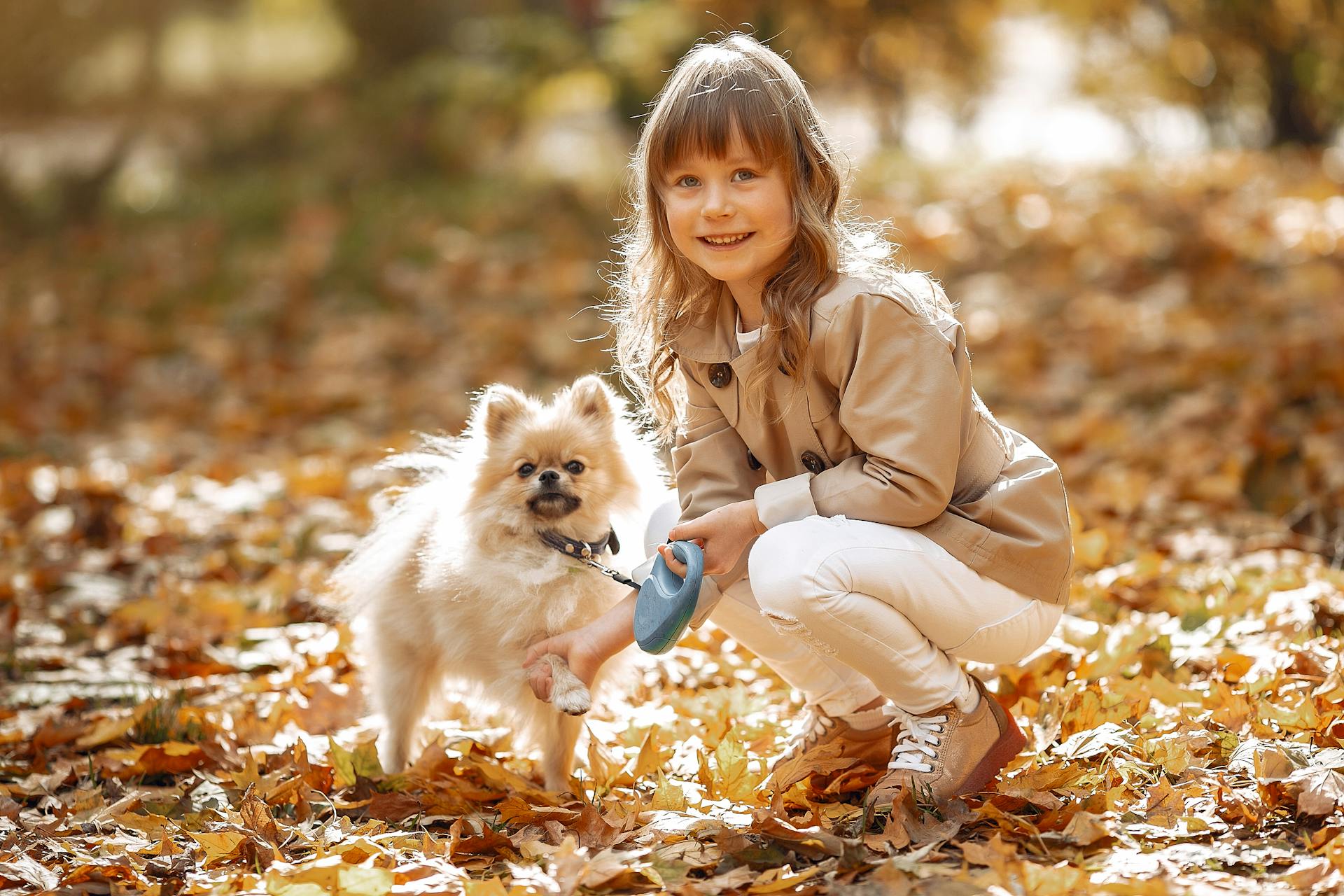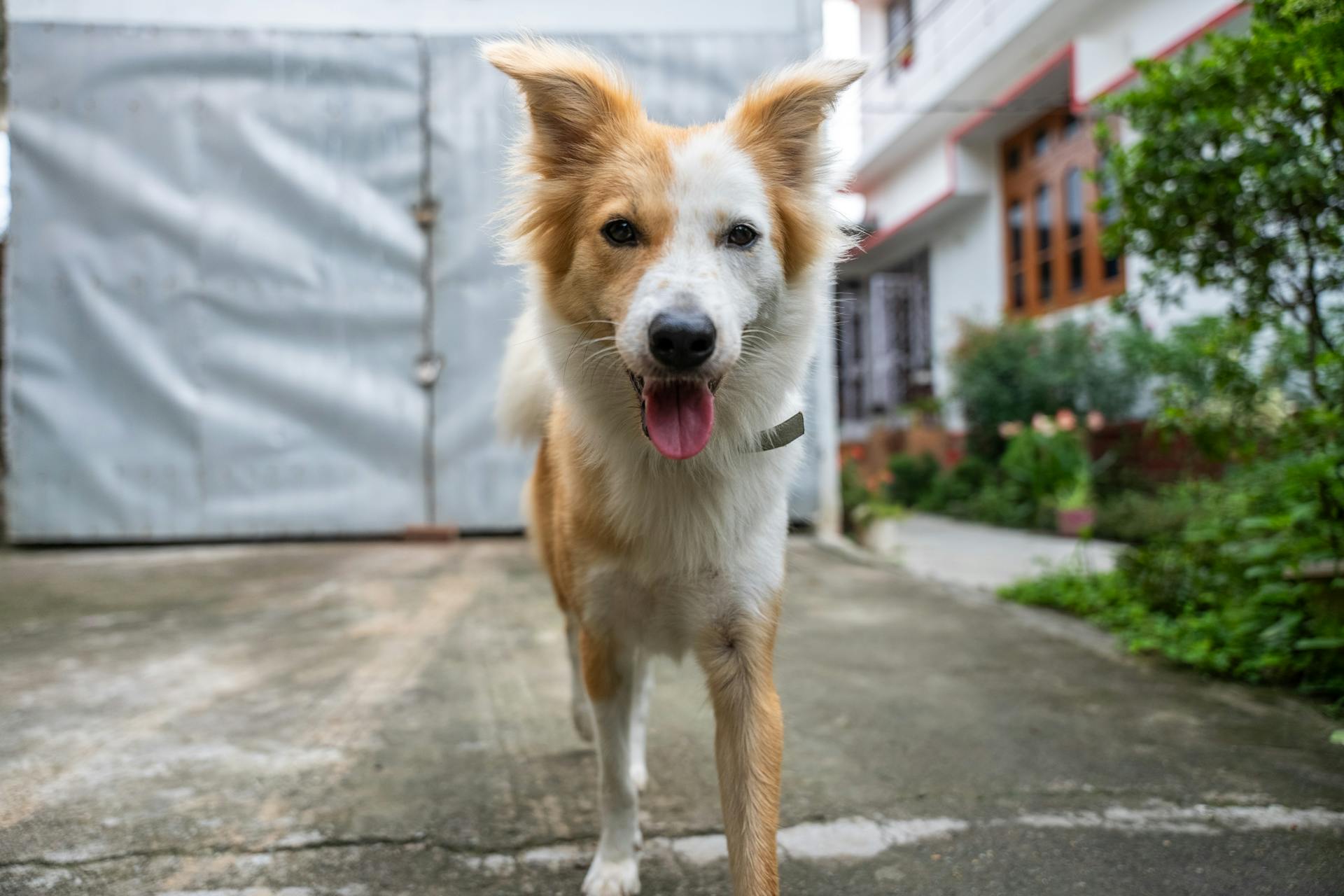
The Icelandic Sheepdog is a breed that's steeped in history and has a unique appearance to match. Originating in Iceland, this breed has been working as a herder for centuries.
They're a medium-sized dog with a muscular build and a thick double coat that's perfect for the harsh Icelandic climate. Their coat is one of their most distinctive features, with a thick undercoat and a harsh outer coat that sheds water easily.
Icelandic Sheepdogs are known for their high energy levels, requiring regular exercise to keep them happy and healthy. They're also highly intelligent and trainable, making them a great addition to active families.
Intriguing read: Dogs Breeds That Start with B
Physical Characteristics
The Icelandic Sheepdog is a muscular and hardy dog, well-suited for navigating rough terrain. They typically weigh between 9-14 kg, making them a sturdy companion.
Their height at the withers is about 45 cm for dogs, with bitches being a few centimetres shorter. The coat is thick and provides good protection from the weather, coming in two distinct types: short-haired and long-haired.
The Icelandic Sheepdog's coat is a true asset, offering protection against the elements. It may be light, tan or fawn, ranging from milky-white to reddish brown, or black, chocolate-brown or grey.
White and light markings often occur with all colours, and light, tan and grey animals may have a black mask. Dogs may be expected to live for some twelve to fifteen years.
Here are the different types of coats the Icelandic Sheepdog may have:
They are known for their well-proportioned physique, standing between 16 to 18 inches at the shoulder and weighing 20 to 30 pounds. This size makes them versatile and agile, allowing them to navigate various terrains with ease.
Temperament and Behavior
The Icelandic Sheepdog is a friendly and outgoing breed that loves people. They are naturally affectionate and happy, making them a great addition to any family.
One of the things that sets them apart is their herding instinct, which can cause them to chase cars, bicycles, and motorcycles. This means they need a securely fenced yard to keep them safe.
Icelandic Sheepdogs are also very intelligent and respond well to positive reinforcement training. Consistent training can help minimize their barking, which can be a challenge for some owners.
Despite their friendly nature, Icelandic Sheepdogs can be reserved in new situations, especially if they haven't been properly socialized from an early age. Early socialization is key to helping them become comfortable in different settings.
Their herding background can also influence their behavior around other pets, so it's essential to socialize them well and teach them to respect other animals. With proper training and socialization, they can coexist peacefully with other pets.
Icelandic Sheepdogs are naturally protective of their families, making them excellent watchdogs. However, they are not inherently aggressive and will often bark at strangers rather than attacking them.
Their playful and lively nature makes them a joy to be around, and they thrive on attention and interaction with their family members. They don't like to be left alone for long periods, so it's essential to provide them with plenty of toys and activities to keep them occupied.
Overall, Icelandic Sheepdogs are a wonderful breed that make great family pets for active families who can provide them with the attention and exercise they need.
You might enjoy: Best All around Dog Breed
Grooming and Maintenance
The Icelandic Sheepdog sheds excessively, with a dense undercoat that needs to be brushed once or twice a week to remove loose or dead hair. This will help reduce the amount of hair floating through the air or settling on clothes or furniture.
Brushing daily is recommended during seasonal shedding, when the undercoat comes out in clumps. Regular brushing will also help prevent matting and tangles.
His nails will need to be trimmed every two or three weeks, and if he allows it, you can use a grinder on his nails instead of nail clippers.
Take a look at this: Will a Great Pyrenees Attack an Intruder
Shedding Level
The Icelandic Sheepdog sheds moderately throughout the year, with more substantial shedding occurring during seasonal changes. Regular brushing is essential to manage shedding and prevent matting.
Their double coat sheds a lot, especially during seasonal changes, so be prepared for some extra work. Brushing at least two to three times a week can help manage shedding and prevent matting.
Their coat is made up of a double layer, which can be a blessing and a curse - it offers excellent protection but also requires regular grooming. Regular brushing is necessary to keep their coat healthy and prevent matting.
Brushing regularly not only keeps their coat healthy but also strengthens the bond between the dog and its owner. It's a great way to spend quality time with your furry friend.
Breed Maintenance
The Icelandic Sheepdog's coat is a beautiful, double layer that's both thick and waterproof. It comes in two coat lengths: short and long.
You'll need to brush your Icelandic Sheepdog at least weekly to remove loose fur and prevent tangles and mats. Brushing daily is recommended during periods of high shedding, which often occurs in the spring and fall.
Their nails will need to be trimmed every two to three weeks, and if your dog allows it, you can use a grinder instead of nail clippers. Regular nail trimming is essential to prevent overgrowth.
Intriguing read: Two Doberman Pinschers
Cleaning their ears is crucial to prevent infections, and should be done at least once a week. Check their ears for wax buildup, debris, and signs of infection.
You'll also need to brush their teeth regularly, ideally every day, to prevent dental problems. Regular teeth cleaning using a veterinarian-approved toothpaste is essential.
The cost of grooming an Icelandic Sheepdog can vary depending on whether you choose professional grooming services or a do-it-yourself approach. Professional grooming costs can range from $50 to $100 per session.
Readers also liked: Dogo Argentino Teeth
Training and Care
Icelandic sheepdogs need plenty of exercise each day, along with mental stimulation. They typically take well to training, which should begin ideally when they are puppies.
Positive reinforcement methods are highly effective in training Icelandic sheepdogs. They respond well to consistency and enjoy mental challenges.
Early and thorough socialization is essential for Icelandic sheepdogs to develop into well-mannered and confident adults. Exposure to different people, animals, and environments helps them become more accepting and less prone to anxiety or fear in unfamiliar situations.
Icelandic sheepdogs generally want to please their humans, so it's best to use positive training methods. Harsh corrections can be counterproductive and make training more difficult.
A mix of physical and mental activities is essential to ensure a well-rounded and contented Icelandic sheepdog. Herding, obedience trials, and agility competitions are ideal outlets for their energy and intellect.
Consistency and patience are key when training an Icelandic sheepdog. Their independent nature may pose some challenges, but with clear communication and positive reinforcement, they can learn quickly and easily.
Buying and Owning
If you're considering bringing an Icelandic Sheepdog into your family, you'll want to know about the costs involved. Expect to pay around $1,000 to $1,500 for a puppy from a reputable breeder.
Finding a reputable breeder can be a challenge, especially depending on where you live. You may need to get your name on a breed wait list for a dog in need of a home.
If you're not able to find a breeder, you can also check out the National Icelandic Sheepdog Rescue Alliance for dogs in need of a home.
A different take: How Much Exercise Do Border Collies Need
Adopting or Buying a Dog
If you're considering bringing an Icelandic Sheepdog into your life, you'll want to explore your options for adopting or buying one. It's not common to find them at animal shelters or rescue groups, but it's not impossible either.
You can try getting your name on a breed wait list for a dog in need of a home. This is a great way to give a loving home to a dog that really needs it.
Breeders can be a bit harder to come by, depending on where you live. Be prepared to pay around $1,000 to $1,500 for a puppy from a reputable breeder.
If you're interested in adopting an Icelandic Sheepdog, here are some resources to check out:
- Icelandic Sheepdog Association of America
- AKC Marketplace
- National Icelandic Sheepdog Rescue Alliance
These dogs are known for being friendly and playful, making them a great fit for families with kids. They're also intelligent and quick learners, which means they'll pick up commands and tricks in no time.
Kennel Club Recognition
The Icelandic Sheepdog has gained recognition by major kennel clubs, including the American Kennel Club (AKC) and the United Kennel Club (UKC). These organizations have established breed standards that outline the ideal characteristics, ensuring the preservation of the breed's unique qualities.
Recognition by kennel clubs also facilitates participation in conformation shows and other canine events. This is a great opportunity for Icelandic Sheepdog owners to socialize their dogs and show off their skills.
The AKC and UKC breed standards highlight the importance of preserving the breed's unique qualities. This means that breeders and owners must work together to ensure the breed remains true to its origins.
Kennel club recognition is a significant milestone for the Icelandic Sheepdog breed. It demonstrates the breed's popularity and demand, making it a great choice for those looking to bring a new furry friend home.
On a similar theme: American Kennel Club Lancashire Heeler
Popularity
The Icelandic Sheepdog's popularity has been steadily increasing among enthusiasts who appreciate its friendly nature and versatility.
Despite its captivating charm, this breed remains relatively uncommon, which adds to its allure for those seeking a unique canine companion.
Its exclusivity is likely due to its relatively low popularity compared to other breeds.
Return

Returning home with your Icelandic Sheepdog is an exciting moment, but it's essential to remember their natural instincts. Their alertness and protective nature make them vigilant watchdogs.
You'll want to provide your new furry friend with a safe and comfortable space to settle in. Proper training can further enhance their qualities, making them reliable guardians for the home and family.
For your interest: German Shorthaired Pointer Free to Good Home
Frequently Asked Questions
Do Icelandic Sheepdogs bark a lot?
Icelandic Sheepdogs are known to be vocal and may bark excessively, making them a poor fit for those seeking a quiet companion. If you're considering this breed, be prepared for regular barking and potential noise concerns.
Do Icelandic Sheepdogs like to cuddle?
Yes, Icelandic Sheepdogs are known to be affectionate and love to cuddle with their family members. They'll often snuggle up at the first opportunity, making them a great companion for those who enjoy close bonding with their pets.
Are Icelandic Sheepdogs high energy?
Yes, Icelandic Sheepdogs are high-energy dogs that require regular exercise and playtime. They thrive on daily walks and outdoor activities.
What are Icelandic Sheepdogs used for?
Icelandic Sheepdogs were originally bred to safeguard livestock and herd sheep down from mountains, working independently by instinct. They excel at rounding up livestock with their unique herding abilities.
How rare are Icelandic Sheepdogs?
Icelandic Sheepdogs are a rare breed, even in Europe, making them challenging to find outside of Iceland. They are recognized by kennel clubs in North America, but breeders are scarce.
Featured Images: pexels.com

